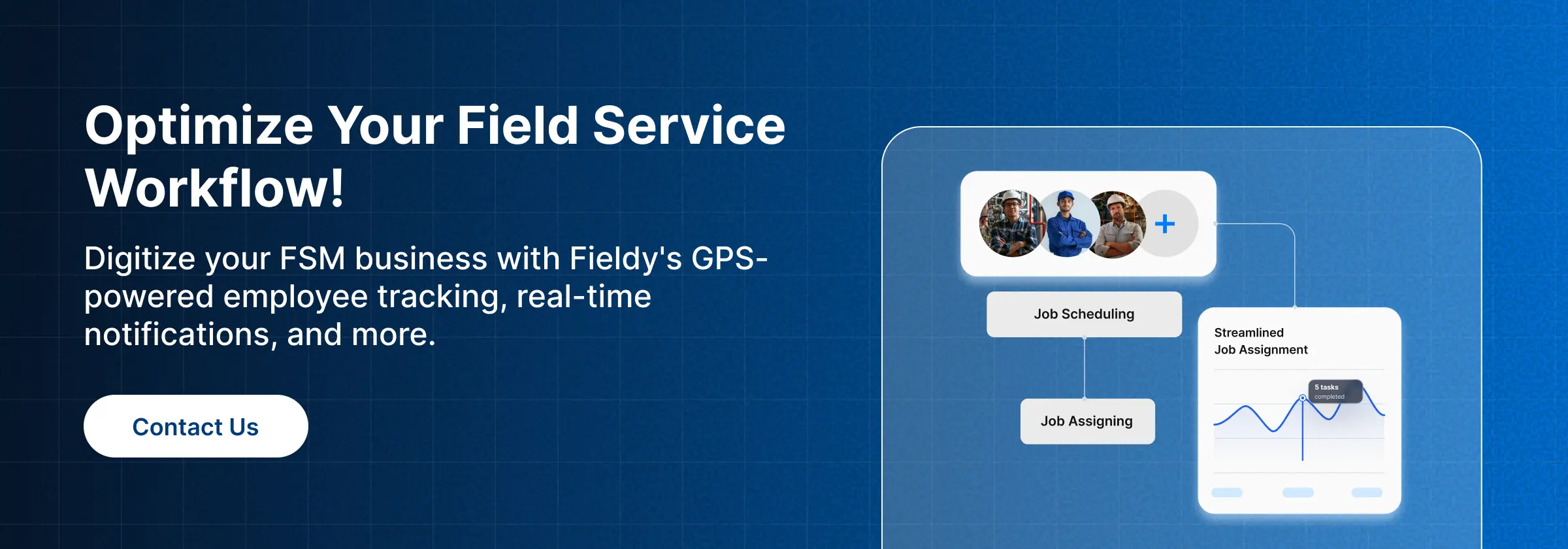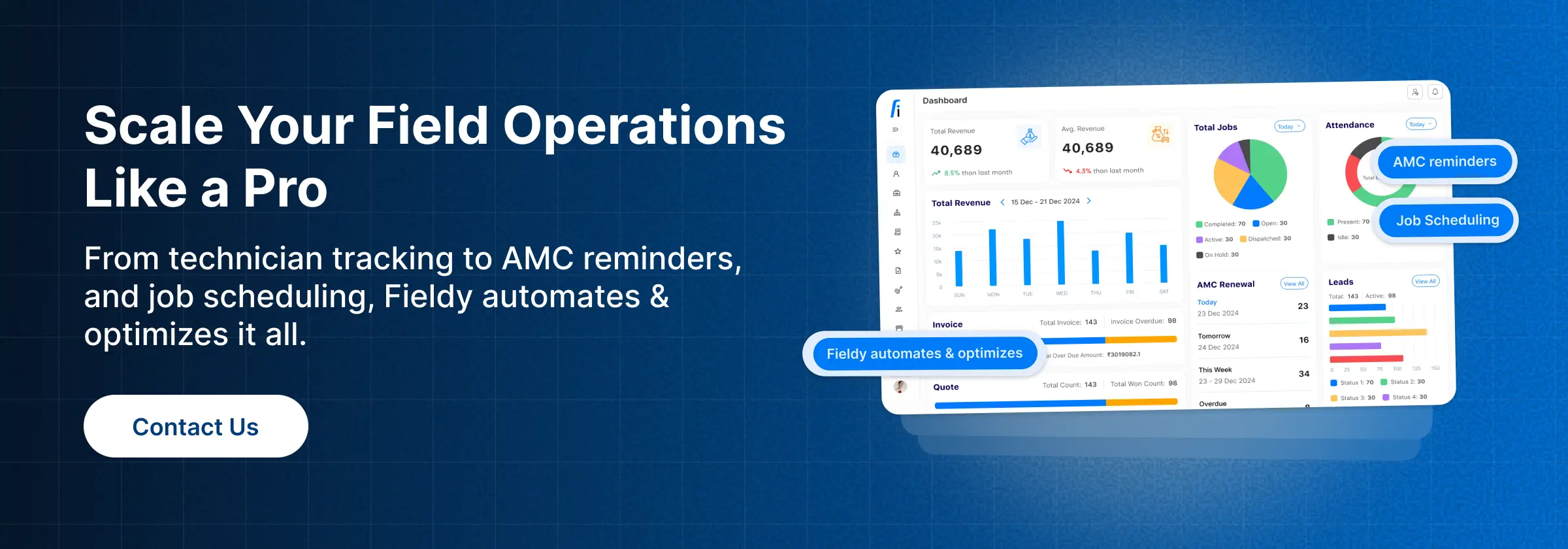🔑 Introduction
Running a small HVAC enterprise comes with various challenges: scheduling technicians, raising invoices, tracking customer contracts, and ensuring prompt job completion. In the manual domain, whether using spreadsheets, paper logs, or an assortment of app-based tools, jobs may be missed, payments may be delayed, and disgruntled customers may raise their levels of complaints.
In the service economy today, the software is no longer classified as something nice to have; rather, it is an essential growth. Field Service News reported that 67% of service companies experienced quicker resolution times after employing mobile FSM tools. For a small HVAC business, purchasing the finest software meant to serve HVAC to small business administration translates to reduced administrative burden for the office, more efficient technicians in the field, and, finally, increased customer loyalty.
If you are looking at different platforms, our field service management software blogs give details about all the solutions against parameters like pricing, usability, and scalability. And if you are narrowing down your options, make sure you look at our Fieldy vs. Jobber deep dive, where we position two of the most popular options available to small service teams.
This guide explores the top 5 HVAC software for small businesses in 2026, analyzing their features, use cases, and limitations. From scheduling and invoicing to AMC (Annual Maintenance Contract) tracking and customer engagement, these solutions are reshaping how HVAC businesses scale.
❄️ List of Best HVAC Software for Small Businesses
🏆 1. Fieldy
Why Fieldy Leads the Market?
Fieldy is not your usual scheduling app; it is an HVAC field service management software tailored for the small and growing business that wants big-league efficiency yet at a much smaller price point. Whereas ServiceTitan or Jobber often add more layers of complexity and hidden costs, Fieldy is a simple all-in-one software solution that small HVAC companies can use to manage customers, contracts, technicians, and payments seamlessly.
What really makes Fieldy stand out in the crowd is its superb balance of mobility, affability, and scalability. Small businesses without much time for long onboarding or costly consulting packages appreciate that. Fieldy removes all that off the bar by providing a plug-and-play experience, which means it’s ready to go in just a day. From that point, the HVAC companies can hit the ground running without needing to turn their operations upside down.
Core Features Built for HVAC Workflows
- 📍Real-time technician tracking with GPS dispatch – Managers always know where technicians are and can reroute them instantly for emergency calls.
- 📅 Job scheduling and smart routing – Optimizes daily routes, cutting down fuel costs and wasted time.
- 🌐 Online booking and instant quotes – Customers can request services online and receive instant, professional quotes.
- 🔁 AMC contract management with automated alerts – Keeps recurring service contracts from slipping through the cracks, boosting renewals.
- 📶 Offline-ready mobile app – Technicians can update job details, capture signatures, and issue invoices even without internet access.
- 💳 Flat $25 per user pricing, no hidden fees – Simple, predictable pricing that’s friendly for small business budgets.
👉 Real-World Example
Consider a small HVAC contractor with just five technicians. Before Fieldy, they were juggling spreadsheets, WhatsApp messages, and delayed invoice processing. After adopting Fieldy, the entire workflow, from booking to dispatching to AMC renewals, runs through a single dashboard. Jobs get assigned in seconds, invoices are sent automatically, and customer satisfaction rises because response times are shorter.
Fieldy doesn’t just improve efficiency; it directly impacts profitability. Faster job turnaround means more daily service calls, while AMC automation ensures steady, recurring revenue. In short, it turns a small, overstretched HVAC company into a well-oiled service machine.
👉 Why Fieldy Beats Alternatives for Small HVAC Businesses
Other HVAC platforms might excel in isolated features like customer engagement (Podium) or enterprise-grade reporting (Microsoft Dynamics), but they either miss the all-in-one practicality or overwhelm small businesses with complexity. Fieldy stands apart because it was created with the realities of small HVAC business workflows in mind, mobile-first, contractor-friendly, and affordable.
For HVAC companies looking for software that’s easy to adopt, packed with relevant features, and built to grow with them, Fieldy is the smartest choice in 2026.
🛠️ 2. Housecall Pro
Housecall Pro is one of the most widely adopted FSM tools among small residential service businesses. Its simple mobile interface and automation features make it especially popular with HVAC technicians who don’t want to deal with complex IT systems. Check out our detailed review of Fieldy vs HousecallPro FSM software for more.
Best For:
- Solo technicians or small HVAC teams
- Residential service providers offering quick jobs and emergency repairs
Key Benefits:
- 🔔 Automated customer reminders and notifications: These ensure customers never miss scheduled service, reducing last-minute cancellations and boosting technician productivity.
- 💳 Digital invoicing and payment processing: Allows businesses to generate professional invoices instantly and accept payments on-site, speeding up cash flow and minimizing follow-ups.
- 📱 Easy scheduling via mobile app: Technicians can view, update, and complete jobs from anywhere, while admins can reschedule in real time, helping businesses respond faster to emergency repair requests.
⚠️ Where It Falls Short
Housecall Pro shines in simplicity but lacks advanced features like Software for AMC tracking or GPS asset monitoring. This is where Fieldy holds a competitive edge by offering both ease of use and contract management depth in one platform.
📅 3. Jobber
Jobber is another well-known FSM platform that combines job scheduling, CRM, and financial tools. Its integrations with QuickBooks and Stripe make it particularly useful for HVAC teams that prioritize billing and bookkeeping efficiency. Our Fieldy vs Jobber short comparison will give you the gist of it.
Best For:
- Small to medium HVAC businesses managing multiple job types, from installations to routine maintenance.
- Teams that require accounting-friendly workflows to keep finances accurate and organized.
Key Benefits:
- 🗓️ Drag-and-drop scheduling for jobs: Makes assigning and adjusting technician schedules quick and intuitive, reducing errors and saving admin time.
- 💰 Automated quotes and invoicing: Generates professional estimates and invoices instantly (similar to our field service invoicing software), ensuring faster approval and payment cycles.
- 🔗 Seamless QuickBooks and Stripe integrations: Simplifies bookkeeping and payments by directly syncing financial data, eliminating double entry.
⚠️ Where It Falls Short
While Jobber is strong on scheduling and financial management, it doesn’t include predictive maintenance tools or AMC tracking, which are critical for long-term HVAC contracts. Fieldy offers these features out-of-the-box.
💬 4. Podium
Podium is not a traditional FSM platform, but it plays a crucial role in customer communication and reputation management. For HVAC businesses, reviews and trust are everything, 70% of customers check online feedback before booking a service.
Best For:
- HVAC teams focused on customer acquisition, aiming to turn every service call into a long-term client relationship.
- Businesses wanting to boost reviews and repeat bookings by building trust and credibility online.
Key Benefits:
- 💬 Centralized customer communication via SMS and chat: Keeps all client conversations in one place, making follow-ups faster and more professional.
- 🌟 Automated review requests after service completion: Encourages happy customers to leave positive feedback, strengthening your online reputation.
- 📲 Lead management from multiple online channels: Captures and organizes leads from web, social, and referral sources, ensuring no opportunity is missed.
⚠️ Where It Falls Short
Podium helps HVAC businesses win more customers but doesn’t manage day-to-day operations like technician tracking or AMC renewals. Again, Fieldy bridges this gap by integrating Podium-like communication directly into its platform.
🏢 5.BuildOps
BuildOps is built with large commercial service contractors in mind. It provides a robust suite of tools for managing multi-site projects, complex dispatching, and compliance-heavy environments.
Best For:
- Large HVAC contractors handling commercial and industrial projects where jobs are complex and often span weeks or months.
- Businesses requiring structured work order management to ensure every task, part, and technician is tracked in real time.
Key Benefits:
- 🏗️ Advanced project management capabilities: Helps manage multi-phase jobs with timelines, dependencies, and resource allocation.
- 🌍 Multi-location dispatch and work order tracking: Ensures teams across different sites stay aligned without operational delays.
- 🔗 Office-to-field communication tools: Keeps back-office staff and technicians connected, reducing miscommunication and improving job completion rates.
⚠️ Where It Falls Short
While powerful, BuildOps can feel overwhelming (and costly) for small HVAC businesses. It’s better suited to large enterprises with big budgets. For smaller players, Fieldy offers a lighter, more affordable alternative without losing functionality.
🌟 Final Thoughts
All five tools reviewed here bring something valuable to the table:
- ✅ Housecall Pro – Simple, mobile-first workflows
- ✅ Jobber – Strong scheduling and billing integrations
- ✅ Podium – Review management and customer communication
- ✅ BuildOps – Advanced enterprise-scale capabilities
- ✅ Fieldy – All-in-one platform optimized for small HVAC businesses
But here’s the truth: most small businesses can’t afford to juggle multiple tools or pay for enterprise systems. That’s why Fieldy stands out as the best HVAC software for small businesses, combining scheduling, AMC tracking, GPS monitoring, customer engagement, and invoicing in one intuitive platform.
According to McKinsey, businesses that adopt predictive maintenance see 40% less downtime and 26% higher SLA compliance. For HVAC service providers, that translates to more contracts, happier customers, and long-term growth.
Want to explore more options? Check out our guide to the top field service management software for 2026.


![Best 5 HVAC Software for Small Businesses [Supreme Guide For 2026]](https://blog-admin.getfieldy.com/wp-content/uploads/2025/09/Best-HVAC-Software-For-Small-Business.webp)

